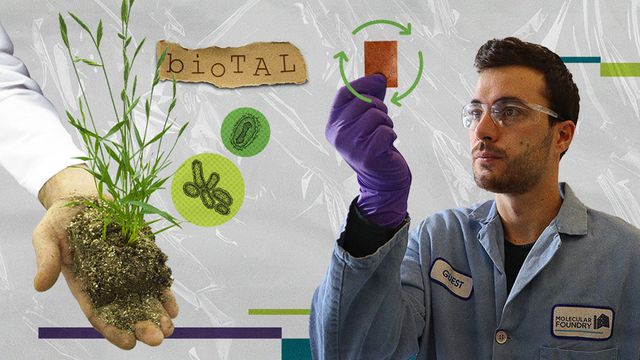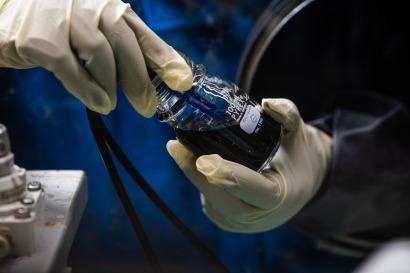Thanks. Hearken to this text utilizing the participant above. ✖
Plastic waste is an issue. Most plastics can’t be recycled, and plenty of use finite, polluting petrochemicals as the fundamental elements. However that’s altering. In a examine revealed at this time in Nature Sustainability , researchers efficiently engineered microbes to make organic options for the beginning elements in an infinitely recyclable plastic often called poly(diketoenamine), or PDK.
The discovering comes from collaboration amongst specialists at three amenities on the Division of Power’s Lawrence Berkeley Nationwide Laboratory (Berkeley Lab): the Molecular Foundry, the Joint BioEnergy Institute (JBEI), and the Superior Mild Supply.
“That is the primary time that bioproducts have been built-in to make a PDK that’s predominantly bio-based,” mentioned Brett Helms, workers scientist on the Molecular Foundry who led the venture. “And it’s the primary time that you just see a bio-advantage over utilizing petrochemicals, each with respect to the fabric’s properties and the price of producing it at scale.”
In contrast to conventional plastics, PDK might be repeatedly deconstructed into pristine constructing blocks and fashioned into new merchandise with no loss in high quality. PDKs initially used constructing blocks derived from petrochemicals, however these elements might be redesigned and produced with microbes as an alternative. Now, after 4 years of effort, collaborators have manipulated E. coli to show sugars from vegetation into among the beginning supplies – a molecule often called triacetic acid lactone, or bioTAL – and produced a PDK with roughly 80% bio-content.
“We’ve demonstrated that the pathway to 100% bio-content in recyclable plastics is possible,” mentioned Jeremy Demarteau, a venture scientist on the staff contributing to biopolymer improvement. “You’ll see that from us sooner or later.”
PDKs can be utilized for quite a lot of merchandise, together with adhesives, versatile gadgets like pc cables or watch bands, constructing supplies, and “robust thermosets,” inflexible plastics made by a curing course of. Researchers had been shocked to seek out that incorporating the bioTAL into the fabric expanded its working temperature vary by as much as 60 levels Celsius in comparison with the petrochemical model. This opens the door to utilizing PDKs in gadgets that want particular working temperatures, together with sports activities gear and automotive elements similar to bumpers or dashboards.
Need extra breaking information? Subscribe to Know-how Networks’ each day publication, delivering breaking science information straight to your inbox day by day. Subscribe for FREE
Fixing the plastic waste downside
The United Nations Surroundings Program estimates that we globally produce about 400 million tons of plastic waste yearly, and that quantity is predicted to climb to greater than 1 billion tons by 2050. Of the 7 billion tons of plastic waste already created, solely about 10 % has been recycled, whereas most is discarded into landfills or burned.
“We will’t preserve utilizing our dwindling provide of fossil fuels to feed this insatiable want for plastics,” mentioned Jay Keasling, a professor at UC Berkeley, senior college scientist in Berkeley Lab’s Biosciences Space, and the CEO of JBEI. “We wish to assist remedy the plastic waste downside by creating supplies which can be each biorenewable and round – and offering an incentive for firms to make use of them. Then folks may have the merchandise they want for the time they want them, earlier than these gadgets are remodeled into one thing new.”
The examine launched at this time additionally builds on a 2021 environmental and technological evaluation , which confirmed that PDK plastic may very well be commercially aggressive with standard plastics if produced at a big scale.
“Our new outcomes are extraordinarily encouraging,” mentioned Corinne Scown, a workers scientist in Berkeley Lab’s Power Applied sciences Space and a vice chairman at JBEI. “We discovered that with even modest enhancements to the manufacturing course of, we may quickly be making bio-based PDK plastics which can be each cheaper and emit much less CO2 than these made with fossil fuels.”
These enhancements would come with dashing up the speed at which microbes convert sugars to bioTAL, utilizing micro organism that may rework a greater variety of plant-derived sugars and different compounds, and powering the ability with renewable power.
This work was supported by the Division of Power’s Bioenergy Applied sciences Workplace. The Molecular Foundry is a DOE Workplace of Science, Workplace of Fundamental Power Sciences consumer facility that focuses on nanoscale science. JBEI is a Bioenergy Analysis Heart funded by DOE’s Workplace of Science. The Superior Mild Supply is a DOE Workplace of Science consumer facility.
PDK know-how is accessible for licensing and collaboration. If , please contact Berkeley Lab’s Mental Property Workplace, ipo@lbl.gov .
Reference: Demarteau J, Cousineau B, Wang Z, et al. Biorenewable and round polydiketoenamine plastics. Nat Maintain. 2023. doi: 10.1038/s41893-023-01160-2
This text has been republished from the next supplies. Word: materials might have been edited for size and content material. For additional info, please contact the cited supply.



